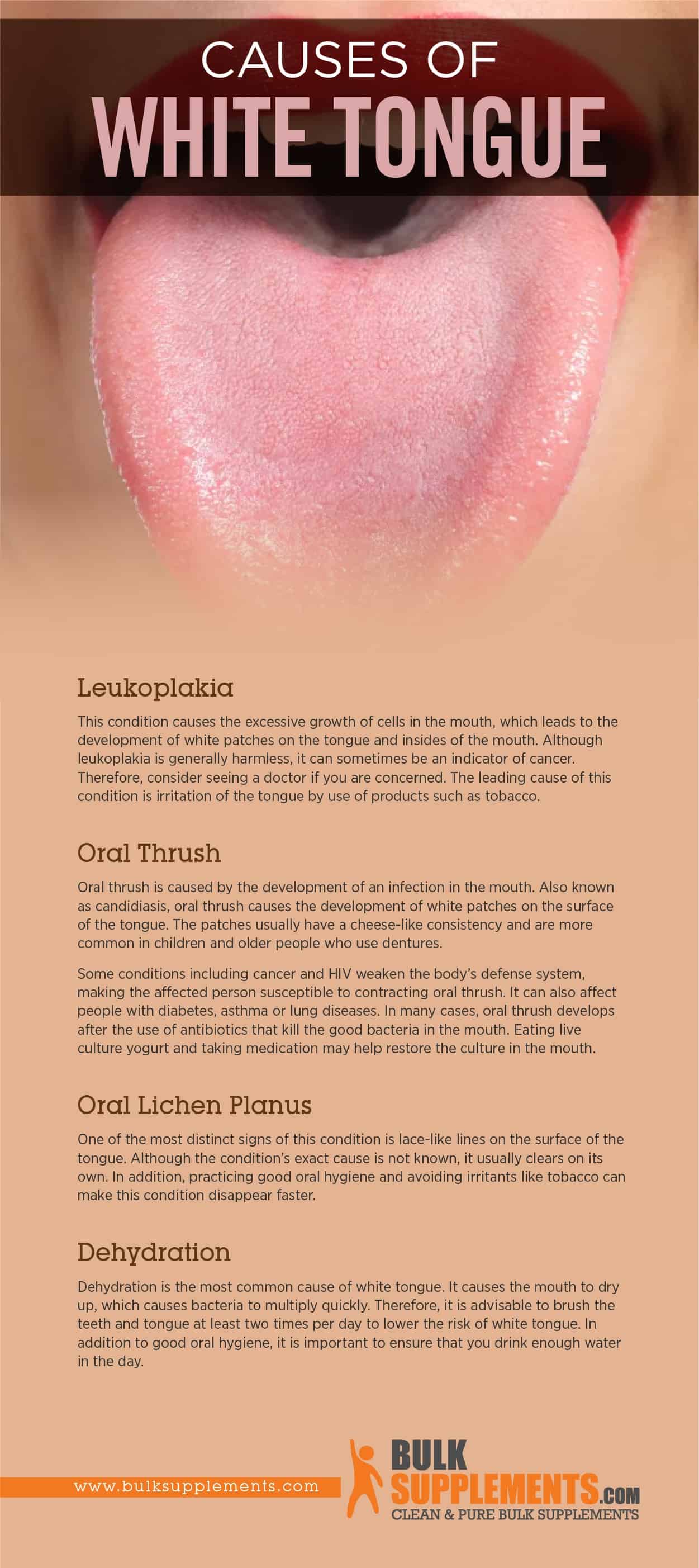White Tongue: Symptoms, Causes & Treatment

White Tongue
What is White Tongue?
White tongue is essentially the buildup of bacteria and remnants of food on the tongue. The leading causes of the condition are dehydration and illness. White tongue or white spots and patches on the tongue may also be caused by infection, inflammation of the surface of the tongue and irritation of the tongue by a foreign object.
Some oral infections, including Candida yeast infection, may cause whitening of the tongue. Although yeast infection or oral thrush may be caused by various factors, it is more common in people whose immunity has been compromised, such as patients with cancer and HIV. White tongue may also be caused by general dryness, which can occur through periods of not speaking or eating.
White Tongue Symptoms
White tongue is itself a symptom of other conditions and presents differently with each condition.
Leukoplakia Symptoms
White tongue is often characterized by the development of white patches in the mouth or on the tongue. The patches are usually painless and raised, but cannot be removed by scraping. The white patches may develop on the surface of the tongue, inside the cheeks, the bottom of the mouth, gums and lower lips.
Oral Lichen Planus Symptoms
This condition causes the development of white patches on the tongue, insides of cheeks and/or gums. Mild cases of the condition are usually painless. However, severe cases may cause pain and redness of the gums, burning sensation on the surface of the tongue, and soreness inside the cheeks, especially when eating or drinking.
Geographic Tongue Symptoms
This condition causes whitening of the top, bottom and sides of the tongue. It is usually characterized by wavy white lines that surround red areas. The name geographic tongue stems from the fact that the condition causes the tongue to look like the outline of a map. The wavy white lines on the tongue usually shift positions and shapes with time.
Oral Thrush Symptoms
Oral thrush is characterized by the development of white patches on the surface of the mouth (x). The patches can quickly become painful, red or bloody if wiped away. This condition also causes a burning sensation on the tongue’s surface, loss of taste, redness of the insides of the mouth and throat and cracking on the corners of the mouth.
Left untreated, the symptoms of oral thrush usually worsen. In severe cases, the infection could spread to other parts of the body.
Syphilis Symptoms
This disease causes the tongue to develop a small, painless sore about ten days to three months after infection through oral sex. Left untreated, syphilis could cause the tongue to become white, a condition known as syphilitic leukoplakia. Common symptoms associated with this condition include headaches, fever, joint pain and inflamed glands.
Causes of White Tongue
Leukoplakia
This condition causes the excessive growth of cells in the mouth, which leads to the development of white patches on the tongue and insides of the mouth. Although leukoplakia is generally harmless, it can sometimes be an indicator of cancer. Therefore, consider seeing a doctor if you are concerned. The leading cause of this condition is irritation of the tongue by use of products such as tobacco.
Oral Thrush
Oral thrush is caused by the development of an infection in the mouth. Also known as candidiasis, oral thrush causes the development of white patches on the surface of the tongue. The patches usually have a cheese-like consistency and are more common in children and older people who use dentures.
Some conditions including cancer and HIV weaken the body’s defense system, making the affected person susceptible to contracting oral thrush. It can also affect people with diabetes, asthma or lung diseases. In many cases, oral thrush develops after the use of antibiotics that kill the good bacteria in the mouth. Eating live culture yogurt and taking medication may help restore the culture in the mouth.
Oral Lichen Planus
One of the most distinct signs of this condition is lace-like lines on the surface of the tongue. Although the condition’s exact cause is not known, it usually clears on its own. In addition, practicing good oral hygiene and avoiding irritants like tobacco can make this condition disappear faster.
Dehydration
Dehydration is the most common cause of white tongue. It causes the mouth to dry up, which causes bacteria to multiply quickly. Therefore, it is advisable to brush the teeth and tongue at least two times per day to lower the risk of white tongue. In addition to good oral hygiene, it is important to ensure that you drink enough water in the day.

White Tongue Diagnosis
A visual exam is the most common way to diagnose white tongue. However, doctors may also take tissue samples from the white patches for further analysis in a lab. In some cases, doctors may also take blood tests to check for underlying conditions such as diabetes, syphilis or malnutrition.
When to See a Doctor
White tongue usually heals on its own and should not be a cause for alarm if there are no accompanying symptoms. However, consider seeing a doctor if white tongue does not disappear in about two weeks. In addition, see a doctor if you experience:
- Pain on the tongue
- Burning sensation on the tongue
- Difficulty chewing, swallowing or talking
- Fever
- Weight loss
- Skin rashes
White Tongue Treatment
Oral Hygiene
Oral hygiene is an efficient prevention and treatment measure for white tongue. Therefore, it is advisable to brush your teeth at least twice per day. If possible, brush your teeth after each meal. Also, consider tongue scraping to rid your tongue of debris, bacteria and dead cells.
Tongue scraping does not only help to get rid of white tongue, but it also improves the smell of your breath. Use a gentle brush to scrape your tongue in back and forward motions. Consider buying brushes designed specifically for tongue scraping.
Use a fluoride mouthwash at least once per day. Also, floss daily, preferably after each meal. Consider seeing a dentist at least twice per year for cleaning and checkup. White tongue is a common condition among people who smoke and drink. Therefore, avoid using tobacco or alcohol because tobacco is an irritant and alcohol causes dehydration, both of which cause white tongue.
White Tongue Supplements
White tongue may not require treatment because it often clears on its own depending on the root cause. In some cases, a soft toothbrush can be used to brush off the white area gently but this should be done with caution because removal of the white area in cases of oral thrush removal can cause pain. In addition, drinking lots of water and other fluids can help flush away the bacteria and debris causing white tongue. Treatment may be recommended in some cases. The type of treatment to be given will depend on the cause of the condition.
Leukoplakia does not require treatment. However, you may need to see a dentist regularly to prevent the condition from worsening. Good oral hygiene, as well as ceasing smoking, can help clear up the white patches.
Oral lichen planus also does not require treatment. However, doctors may prescribe steroid sprays and mouth rinse in severe cases. On the other hand, oral thrush is treatable with the administration of antifungal medication. The medication may be in gel, pill, lozenge or liquid form.
SEE ALSO

Pelvic Inflammatory Disease (PID): Symptoms, Causes & Treatment
Syphilis is a complicated condition and needs medical supervision, though it can be treated with penicillin. However, multiple doses of penicillin may be required to treat patients who have had the disease for a prolonged period.
Aloe Vera
Aloe vera can help treat bacterial and fungal infections and is known for its anti-inflammatory properties. Since ancient times, various communities have used aloe vera to treat infections, burns, skin irritations and wounds. It can also be used to treat white tongue. When ingested, this supplement supports digestion and eases indigestion.
Like any other supplement, aloe vera has side effects, including abdominal discomfort.
Avoid taking this supplement if you have Crohn’s disease, ulcerative colitis and kidney problems. In addition, consult a doctor before using this supplement if you have diabetes or have an upcoming surgery in less than two weeks. Nursing and pregnant women should not take this supplement orally. To use, swoosh the aloe vera solution in your mouth for about five minutes and then spit it out.
Coconut Oil
This is rehydrating and rich in antioxidants and ideal for treating white tongue and other health conditions. Coconut oil is rich in electrolytes, potassium and antioxidants. It promotes gut and cardiac health. To use, rinse a solution of coconut oil in your mouth for about ten minutes before spitting the oil out. This supplement is highly soluble and can be mixed with water or smoothies before consuming it. Coconut oil also cleans the debris in the mouth that may be causing white tongue. In addition, coconut oil is effective in eliminating bacteria that cause bad breath.
Although coconut oil is considered generally safe for use for adults, avoid taking the supplement if you are pregnant or breastfeeding. In addition, consult a doctor before taking the supplement if you have diabetes or heart conditions. Do not use the supplement two weeks before a scheduled surgical procedure.
Garlic
Garlic is an effective home remedy for white tongue due to its antifungal properties. Its effectiveness in treating fungal infections can be attributed to allicin, one of its active compounds. In addition, garlic is rich in vitamins, copper, iron, zinc and antioxidants.
Garlic supplements can strengthen the immune system to fight viral, bacterial and fungal infections. The serving size recommended by nutritionists is 650 milligrams per day.
Probiotics
One of the causes of oral thrush and white tongue is an imbalance of bacteria in the gut. Probiotics can normalize the balance of bacteria in the gut and treat related health complications, including candida. In addition, probiotics promote oral health because they inhibit the accumulation of harmful microbes in the mouth and gut.
The Bottom Line
White tongue is a health condition characterized by the development of white spots and patches on the tongue. Although the condition is usually harmless and painless, it may be an indicator of underlying health complications such as oral thrush, cancer, syphilis or dehydration. Exposure to irritants such as tobacco and alcohol can also cause white tongue. Treatment for white tongue is determined by the underlying cause. In addition, home remedies such as garlic and aloe vera can aid in the treatment of white tongue. Good oral hygiene is recommended for the prevention and treatment of white tongue.



